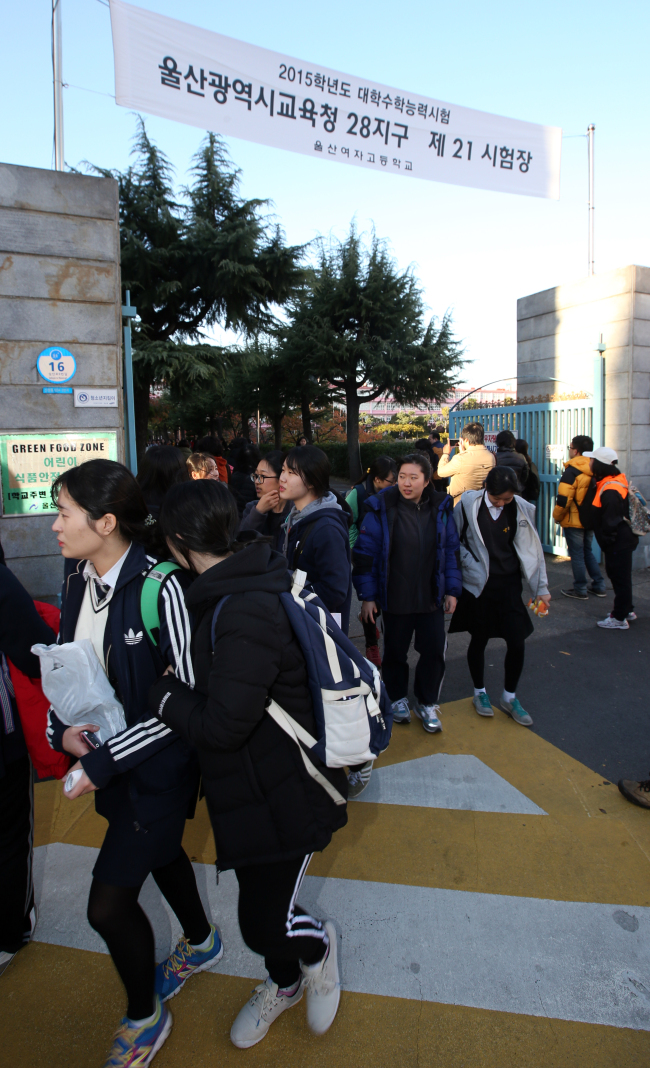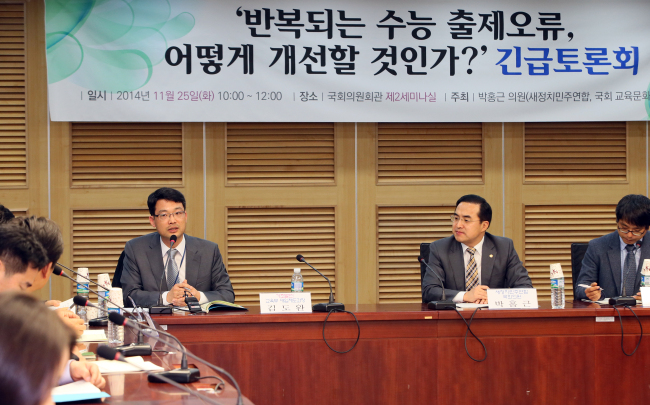College entrance exam at crossroads
Education authorities scrutinize state test, seek reform
By Yoon Min-sikPublished : Dec. 4, 2014 - 21:17
South Korea’s Education Ministry on Wednesday launched a civilian committee to reform the country’s trouble-laden college entrance exam, Suneung, following public criticism over its inconsistent difficulty level and reccurring errors.
The move was in response to the public outcry after the Korea Institute for Curriculum and Evaluation ― in charge of making the exam questions ― acknowledged that two questions in this year’s annual exam were flawed, marking a second straight year an error was found in the exam.
Adding insult to injury, this year’s math and English tests saw a spike in the number of high scorers, intensifying competition among students in the upper bracket.
Suneung is now facing doubts from scholars, education experts and even politicians who have called for reform of the 20-year-old system.
Last month, President Park Guen-hye called for an overhaul of the college entrance exam in a way that is “true to its founding purposes.”
“Replacing people in charge (of tests) is not enough, we need to fix the defective system,” Education Minister Hwang Woo-yea’s said last week during a meeting with reporters. “I agree with the president, who is basically telling us to examine the reasons we introduced the exam in the first place. We need to diagnose exactly what is wrong with the system and if it is outdated, we could improve, augment or in the worst case scenario, abolish it.”
Ironically, the exam itself was introduced to reform a preexisting entrance exam called “Hangnyeok-gosa (academic ability test),” which was criticized for having too many subjects and being based on rote memorization.
The move was in response to the public outcry after the Korea Institute for Curriculum and Evaluation ― in charge of making the exam questions ― acknowledged that two questions in this year’s annual exam were flawed, marking a second straight year an error was found in the exam.
Adding insult to injury, this year’s math and English tests saw a spike in the number of high scorers, intensifying competition among students in the upper bracket.
Suneung is now facing doubts from scholars, education experts and even politicians who have called for reform of the 20-year-old system.
Last month, President Park Guen-hye called for an overhaul of the college entrance exam in a way that is “true to its founding purposes.”
“Replacing people in charge (of tests) is not enough, we need to fix the defective system,” Education Minister Hwang Woo-yea’s said last week during a meeting with reporters. “I agree with the president, who is basically telling us to examine the reasons we introduced the exam in the first place. We need to diagnose exactly what is wrong with the system and if it is outdated, we could improve, augment or in the worst case scenario, abolish it.”
Ironically, the exam itself was introduced to reform a preexisting entrance exam called “Hangnyeok-gosa (academic ability test),” which was criticized for having too many subjects and being based on rote memorization.

Education authorities in the late 1980s and the early 1990s revamped the test to focus more on a student’s ability to think and solve problems. The test subjects were also narrowed to Korean language, English, math and a choice between science or social studies. The new format was implemented in 1993.
Most Korean students wishing to enter college now take the state-commissioned test on the second Thursday of November in their high school senior year, and those who fail to get the desired scores have to wait a year to take it again. While the college admission process also consists of interviews and essays, Suneung is usually the biggest difference-maker.
But the high stakes of the exam resulted in skyrocketing private education spending ― the annual figure is north of 19 trillion won ($19 billion) ― and students coming under extreme pressure, some even taking their own lives around the time of the exam.
Students and parents put so much emphasis on the exam that public education eventually became second priority to cram schools that prepared students for Suneung.
To reduce private education costs, former President Lee Myung-bak’s administration introduced a policy that mandated over 70 percent of Suneung questions had to be derived from TV lectures on public education channel EBS.
But that has effectively seen EBS lectures and textbooks replacing school curriculums, an unnamed high school teacher said. He added many teachers are resorting to just covering EBS lectures, distorting the public education system.
“A test that is conducted once a year, within one day, has lost its legitimacy as the yardstick of students’ competence. The ministerial reform’s directive should be to identify what is causing so many errors, on the basis that it should also normalize public education and reduce private education,” said Rep. Youn Kwan-suk of the New Politics Alliance for Democracy.

Some experts are saying that Suneung should be made a qualification exam based on an absolute grading system. As of now, the exam is based on a relative grading system that sorts all students into nine groups for each subject, and top grades are required to get accepted into top-tier schools.
Kim Shin-young, a professor of education at Hankuk University of Foreign Studies, spoke against the relative grading system that prompts excessive educational competition. As Kim is the head of Education Ministry’s committee on Suneung reform, observers are speculating that the ministry is mulling qualification exams.
Work on an absolute grading system for the English test is already underway, with the ministry collecting public opinion. Hwang spoke favorably on absolute grading, but did not confirm whether he planned to expand it to other subjects as well.
“Suneung is basically a test to see if a student has the ability to study in college. Universities should evaluate whether or not they should pick each student, not the state-commissioned exam,” said Ban Sang-jin, a professor of education at Chonbuk National University.
But some teachers have voiced concerns that this measure would result in each university conducting their own entrance exams, which would mount even more pressure on students.
The most pressing issue for now, however, is the reoccurring errors in Suneung. Several experts blamed the process of making the exam questions itself.
According to Yang Jung-ho, a professor of education at Sungkyunkwan University, most of the exam writers are from the same small set of schools, which makes it hard for them to point out errors in questions to each other. Another professor from a university based in North Gyeongsang Province said a professor who landed the job of an exam writer gets to do it nearly every year, which takes away the motivation to do a good job.
He said the KICE should make sure the exam writers are from different schools, and also allow more high school teachers ― who have better idea of what high school students are learning ― to participate in the process.
By Yoon Min-sik (minsikyoon@heraldcorp.com)





![[K-pop’s dilemma] Can K-pop break free from ‘fandom’ model?](http://res.heraldm.com/phpwas/restmb_idxmake.php?idx=644&simg=/content/image/2024/05/09/20240509050541_0.jpg&u=20240509173751)




![[News Analysis] Yoon's first 2 years marked by intense confrontations, lack of leadership](http://res.heraldm.com/phpwas/restmb_idxmake.php?idx=644&simg=/content/image/2024/05/09/20240509050612_0.jpg&u=20240509233252)








![[Today’s K-pop] NCT’s Mark to drop 1st solo album in February 2025](http://res.heraldm.com/phpwas/restmb_idxmake.php?idx=642&simg=/content/image/2024/05/10/20240510050597_0.jpg&u=)